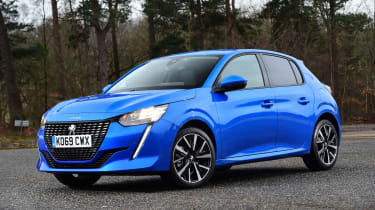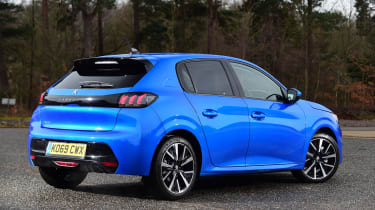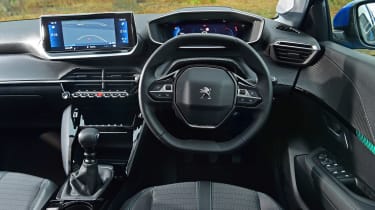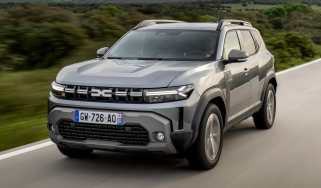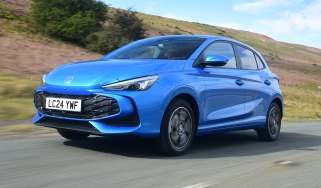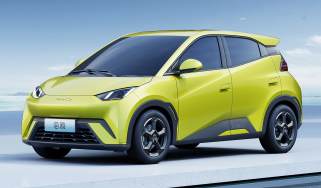Used Peugeot 208 (Mk2, 2020-date) review: a versatile and stylish supermini
A full used buyer’s guide on the Peugeot 208 covering the 208 Mk2 that’s been on sale since 2020
Verdict
The 208 Mk2 was crowned European Car of the Year in 2020. It was the sixth time that a Peugeot had scooped this top honour, and while this prize is never a guarantee of commercial success (or that the car really is truly great), the 208 went on to be a best-seller across Europe, and deservedly so. As well as looking distinctive, the model is well equipped and good to drive, even if it’s no class leader in this respect. Where the 208 really scores as a used buy is with the number of cars available and the breadth of the range; there’s a good selection of power sources and trim levels. There’s no choice of bodystyles, though, because all 208s come with five doors. This shouldn’t be a problem, however, with few buyers wanting a three-door supermini nowadays.
2022 marked half a century since Peugeot introduced its first supermini, the now largely forgotten 104. After many years of producing saloons and estates, with the odd convertible thrown in for good measure, the company embraced the hatchback. Ever since then it has offered a whole raft of small cars, arguably peaking with the 205, which made its debut 40 years ago.
More reviews
The 206 and 207 that came after sold in big numbers, but they didn’t have that ‘je ne sais quoi’ of the 205. Then the 208 arrived in 2012, and it immediately proved that Peugeot was on an upward trajectory with its design and engineering. The transformation was complete when an all-new version was launched a few years later.
History
The Mk2 208 arrived in UK showrooms in February 2020. There was a choice of petrol (PureTech), diesel (BlueHDi) or electric (e-208) editions, priced from £16,250, £18,850 and £25,050 respectively.
The petrol engine was a non-turbo 74bhp 1.2-litre unit, or there was a turbocharged option with either 99bhp or 128bhp. The diesel was a 99bhp 1.5-litre unit, while the e-208 was fitted with a 50kWh battery pack and a 134bhp electric motor.
An updated 208 has just gone on sale, with redesigned front and rear lights, a few extra colour options, a refreshed dashboard layout and a new self-charging hybrid that’s available in two forms: the 99bhp Hybrid 100 and the 134bhp Hybrid 136.
A 154bhp E-208 was also introduced as part of the revamp, alongside the existing model. It has a 54kWh battery pack.
Which one should I buy?
With e-208 values not much higher than for petrol or diesel-engined versions, going electric could make a lot of sense if you can charge at home, slashing your fuel bills.
The only 208 we’d avoid is the non-turbo PureTech 75, which feels lacklustre; any of the other powertrains are worth a look.
All 208s are reasonably well equipped, with the entry-level Active having cruise control and a speed limiter, 16-inch alloy wheels (trims on the e-208), air-con (climate control on the e-208), rear parking sensors and LED headlights. The Allure adds 17-inch alloys (16-inch on e-208), climate control, power-folding door mirrors, automatic wipers and wireless phone charging. A Premium pack available on both the Active and Allure adds sat-nav, while the GT Line brings rear parking sensors and a camera.
Alternatives to the Peugeot 208
The 208 shares its platform and running gear with the Vauxhall Corsa, which is why it has the same choice of 1.2-litre petrol, 1.5-litre diesel and electric powertrains. The Corsa is readily available, good to drive and cheap to run, but not to buy. The Renault Clio comes with petrol, diesel or hybrid powertrains, or if you prefer an electric supermini, there’s the Renault Zoe.
The Ford Fiesta is no longer sold new, and there’s no electrified model, but it’s good to drive and plentiful. The VW Polo, SEAT Ibiza and Skoda Fabia are easy to live with, while the Hyundai i20 and Kia Rio major on value and reliability. Don’t overlook the Suzuki Swift, which is fun, reliable and great value, while the MINI hatch, Toyota Yaris, Nissan Micra and Mazda 2 are worth a closer look.
What to look for
EV range
Peugeot claimed a 211-mile range for the e-208. That became 225 miles in January 2022, then 248 miles from early 2023.
Spare wheel
While the e-208 came with a puncture-repair kit, petrol and diesel versions of the 208 were kitted out with a space-saver spare wheel.
Electric gremlins
Electronic glitches aren’t unusual, so check all of the functions in the infotainment. A software update might fix things, though.
Fuel pump problems
A noisy fuel pump suggests that failure isn’t far off. Poor starting is the first symptom, but ultimately the engine won’t run at all.
Reliability
It isn’t that long since Peugeot trailed many of its rivals for dependability. But the company has turned a corner in recent years, and its cars have far fewer problems. However, a 40th place for reliability in this year’s Driver Power New Car survey shows the French firm still has plenty of room for improvement.
Interior
If you haven’t sat in a Peugeot for a while, you’ll be impressed by how far the company’s cabins have progressed in recent years. The quality is generally excellent throughout, and there are plenty of design flourishes that provide an upmarket feel.
But the small, low-set steering wheel divides opinion, so make sure that you can live with it. The same goes for the climate controls that are hidden within the touchscreen menus. The 208 is one of the smaller cars in its class, so rear-seat space is at a bit of a premium and the 311-litre boot can’t match the capacity of some rivals; drop the seats and this increases to an equally so-so 1,106 litres.
Prices
Most cars for sale have a manual gearbox, but if you prefer an auto, there are plenty available, with these accounting for a third of the 208s on the market. Diesels are unusual, while later hybrids are also not that common.
To check prices on a specific model head over to our valuation tool.
Running costs
All 208s need maintenance every 12 months or 12,500 miles; the schedule runs Interim, Main and Major. The first two cost £209 and £259 respectively (£199 and £229 if pattern parts are used) regardless of engine; the Major service is priced at £379 for a diesel and £409 for petrols (£319 and £349 for pattern parts). The brake fluid needs to be replaced every two years, at £70, with fresh coolant required every 10 years or 112,000 miles. The e-208 needs its first service after a year or 8,000 miles, then every two years or 16,000 miles.
All engines have a cambelt that should be replaced every six years or 62,500 miles, at a cost of £579 if OE parts are used. Using pattern parts for the PureTech drops this to £499, and £459 for the BlueHDi.
Recalls
Half a dozen recalls might sound disappointing, but none affected many cars, and two came on the same day in May 2020 for the same problem (one for the 208 and the other for the e-208, because of faulty wheelarch trim that could come loose). The first action was launched in February 2020, because one car made in August 2019 had incorrectly fitted brake pipes. A second campaign came a month later as a result of loose shock absorbers on a handful of early cars.
Two 208s were recalled in September because some unspecified fixings weren’t tightened up sufficiently on the production line. The most recent recall was issued in April 2023. This affected 152 cars made in February and March 2023, which left the factory with sub-standard tyres that might have needed to be replaced.
Driver Power owner satisfaction
The Mk2 208 didn’t get into the 2023 Driver Power Used Car survey, but came an unspectacular 51st out of 75 in the New Car poll. A seventh for ride and handling was the high spot, along with 17th for the sat-nav. Most categories were mid-table or worse, such as value at 38th, running costs in 39th, and 40th for reliability. Practicality ranked in 58th, while 68th for switch placement was another black mark.
Looking to sell your current car quickly and for a good price? We’ve partnered with Motorway to bring you the best offer from its network of UK dealers...

